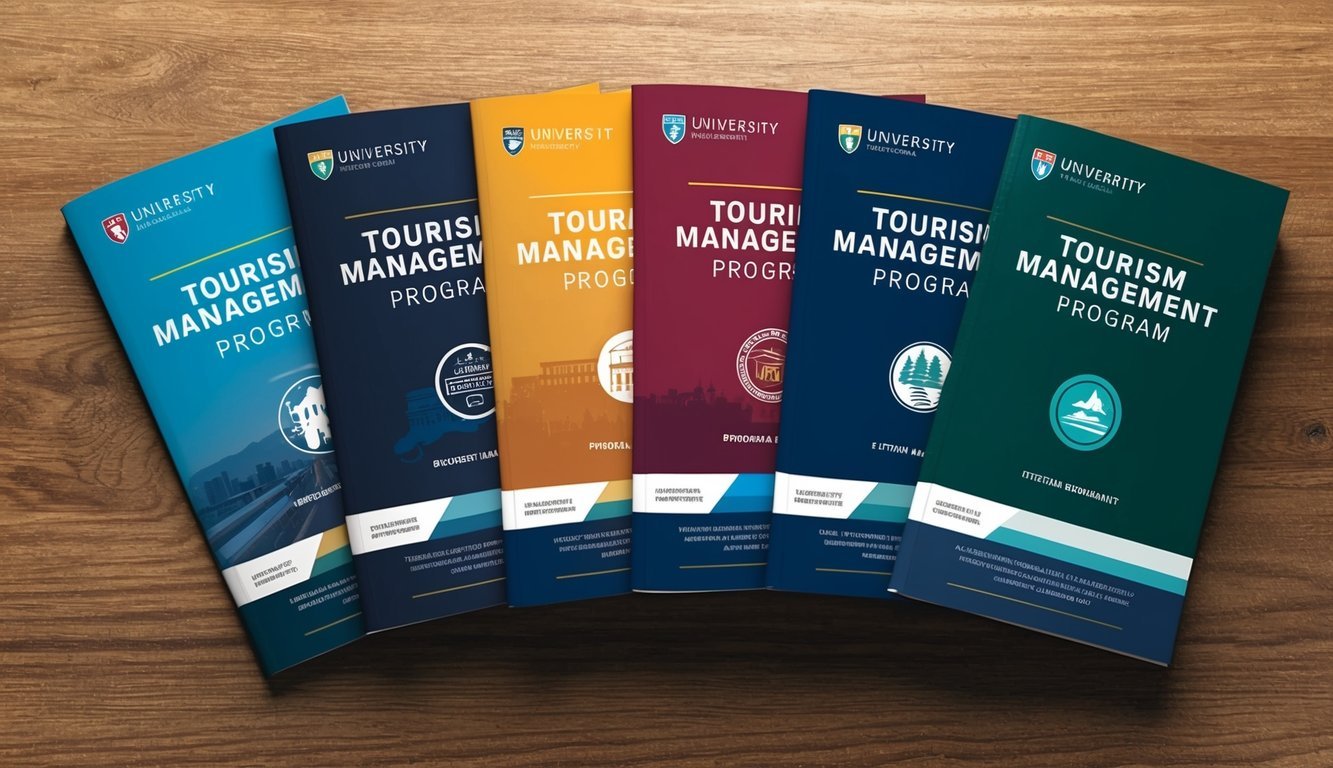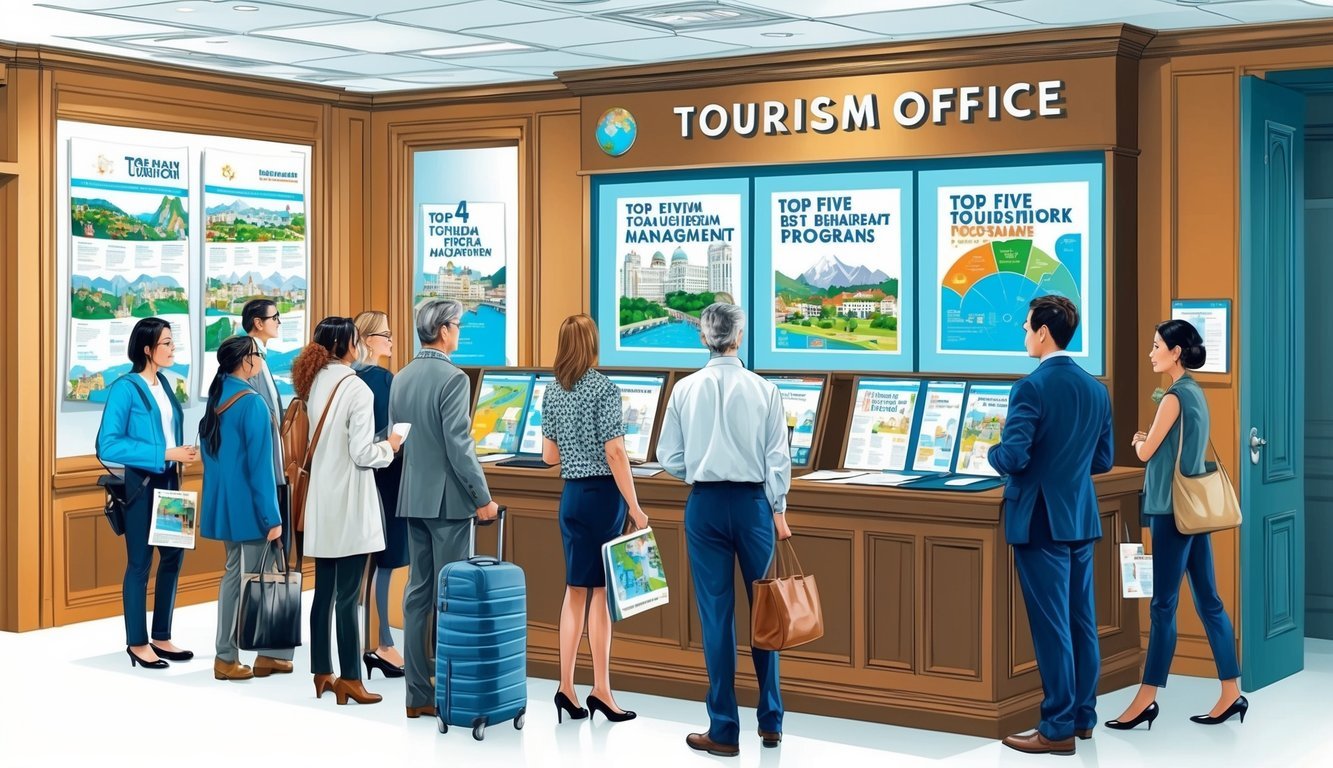Thinking about kicking off a career in tourism? A tourism management degree could be your golden ticket to thrilling opportunities in the travel world! These programs teach you everything from running hotels to planning unforgettable events and managing bustling tourist attractions.

You’ll pick up essential skills like customer service, marketing, and business management. Many top schools offer hands-on experiences through internships at hotels or travel agencies, turning classroom lessons into real-life adventures.
With the right education, you might find yourself working at a beautiful resort, setting sail on a cruise line, or even launching your very own travel business.
Ready to explore some of the best tourism management programs in the country? Let’s dive in!
1) Cornell University School of Hotel Administration
You can’t go wrong with Cornell’s School of Hotel Administration.
This esteemed program has stood the test of time—over a century, in fact! Now called the Cornell Peter and Stephanie Nolan School of Hotel Administration, it’s still packing a punch.
They offer a Bachelor’s in Hotel Administration that’s fantastic for fresh faces in the industry.
You’ll dive right into the business side of hospitality while gaining practical experience.
Already in the field? They’ve got something for you too! Check out their Master of Management in Hospitality program to enhance your skills and climb the career ladder.
Got a busy schedule? No worries! Their Executive Master of Management in Hospitality allows you to study while juggling work commitments.
Cornell is known for blending solid business acumen with hands-on practice, and you’ll learn from some of the best in the biz.
Plus, you’ll be putting theories into action in real-world settings.
2) Rosen College of Hospitality Management

If you want to study tourism right in the heart of one of the world’s most popular vacation spots, check out the Rosen College of Hospitality Management at the University of Central Florida in sunny Orlando.
This place is a big deal.
It’s ranked #1 in the nation for hospitality research and education—pretty impressive, right?
You’ll gain hands-on experience in a city where tourism is a way of life, with theme parks, hotels, and restaurants galore—talk about an exciting classroom!
Rosen College offers a variety of graduate programs in tourism and hospitality management.
Whether you’re aiming for a master’s degree or dreaming of a Ph.D., they have you covered.
Their Master’s in Hospitality and Tourism Management is a popular pick, touching on everything from event planning to managing theme parks and attractions.
With strong industry connections, your chances for internships and post-graduation jobs soar.
Many students land positions with well-known hospitality names right in Orlando.
3) Glion Institute of Higher Education
If you’re set on studying tourism management at a prestigious school, Glion Institute of Higher Education deserves your attention.
This institute has a reputation in hospitality education, boasting campuses in Switzerland and London.
Glion has some exciting programs for future tourism leaders.
Their Bachelor’s in International Hospitality Business is a fantastic starting point that covers managing hotels, resorts, and more.
Looking for something slightly more advanced? Try their Master of Science in Hospitality Business Leadership.
It’s designed to elevate your game in the industry.
Enthralled by luxury tourism? Check out their Master’s in Luxury Management and Guest Experience.
You’ll explore high-end hotels, fine dining, and upscale travel experiences.
For those itching to innovate, there’s the new Master’s in Hospitality, Entrepreneurship, and Innovation.
It’s perfect for budding disruptors in the tourism world.
At Glion, you’re not just buried in textbooks.
You’ll earn practical experience through internships with top-tier companies.
That’s a great way to jumpstart your career in tourism management.
4) Les Roches Global Hospitality Education
Les Roches is another fantastic choice for tourism management.
Established in 1954, it’s built a stellar reputation in the hospitality field.
You can snag a Bachelor’s degree in Global Hospitality Management here.
It takes four years and combines hands-on training with two internships, teaching you the ropes of running hotels and dining establishments.
If you’re aiming to supercharge your career, look into their MBA in Global Hospitality Management.
It’s a perfect fit for professionals eager to level up their expertise.
Les Roches really emphasizes practical experience, allowing you to tackle real-world challenges as you study.
This means you’ll be ready to hit the ground running when you graduate.
A plus? They boast an impressive job placement rate—around 94% of grads find work right away.
That’s something to smile about!
5) Ecole hôtelière de Lausanne

Got your eye on a premier choice in tourism management? Ecole hôtelière de Lausanne (EHL) might just be your top pick.
Founded in 1893, it’s a powerhouse in the hospitality arena.
Located in Switzerland—a country famed for its astonishing hospitality—EHL has claimed the title of the world’s best hotel management school for six years running.
Not too shabby!
They offer a Bachelor of Science in Hospitality Management designed to equip you with the skills to thrive in the hospitality business.
Looking to elevate your expertise? Their Master’s in Global Hospitality Business gives you a truly global viewpoint of the industry.
EHL also provides short courses and online programs for working professionals.
These can be a perfect way to sharpen your skills without committing to a full degree.
At EHL, you won’t just learn about hospitality; you’ll experience it first-hand.
The campus equips you with hands-on practice, offered in a real-world setting—kind of like getting a sneak peek into your future job!
Understanding Tourism Management

Tourism management is really about blending business savvy with hospitality expertise.
To put it simply, you’re responsible for creating fantastic experiences for travelers while keeping everything running smoothly behind the scenes.
Let’s chat about what this journey is really like and why it’s a big deal.
Key Concepts and Principles
Think of tourism management as directing a stellar show—you need to be a jack of all trades.
You’re involved in everything from planning trips to managing hotels and ensuring visitors have a great time.
You’ll gain insights into:
- Marketing strategies to draw in tourists
- Managing finances and budgets
- Preserving the environment
- Appreciating diverse cultures
It’s not all about luxe resorts, either.
You could find yourself working in national parks, museums, or planning massive events.
The goal? Make every visitor’s experience memorable.
Tourism and travel programs are designed to train you in all these areas.
Expect plenty of hands-on practice, not just textbook learning.
Importance in the Global Economy
Tourism is HUGE for many countries.
It’s a significant source of income and job creation.
Studying tourism management means you’re gearing up for a field that literally impacts lives around the globe.
Fun fact? For many nations, tourism can represent a big chunk of their earnings.
It helps:
- Boost local businesses
- Create jobs in hotels, restaurants, and attractions
- Encourage cultural exchanges
But, it’s not always a walk in the park.
You’ll learn about challenges too—for instance, managing overcrowding in certain spots or preserving local customs.
With hospitality management degrees, you’ll get a clear picture of these larger issues.
They prepare you to make wise decisions that benefit both visitors and locals!
How To Choose a Program

Choosing the right tourism management program can shape your career, so it’s crucial to consider a few important factors before making a decision.
Accreditation and Reputation
First off, check if the program is accredited.
Accreditation means the program meets industry standards, which can help you snag better job opportunities after graduation.
Take a good look at the school’s reputation too.
A well-respected institution can open doors you didn’t even know existed.
Read reviews from current students and alumni for some real talk on the program.
And don’t forget to check rankings! While they’re not the only indicator, they can provide insight into how a program measures up against others.
Course Content and Faculty
Scope out the curriculum.
Good programs offer a mix of theory and hands-on experience, covering topics like marketing, finance, and customer service.
Internships or work placements are where the magic happens.
These experiences give you a taste of the real world and can help you make lasting connections.
Your professors matter too! Look for a faculty with real-world experience—these insights can make a big difference and lead to job opportunities down the road.
Also, consider if the program offers specializations.
Maybe you want to focus on event planning or hotel management—find a program that supports your passions.
Career Opportunities in Tourism Management

Graduating in tourism management opens up a world of exciting job prospects everywhere! You’ll find diverse roles with competitive salaries and growth potential in this dynamic industry.
Job Roles and Salaries
For example, hotel managers typically earn between $59,324 and $81,685 per year.
In this role, you’d oversee daily operations and ensure guests are happy as clams.
Event planners are the brains behind conferences, weddings, and other special events.
Their flair for creativity is in high demand across various industries.
Meanwhile, travel agents help clients pick the perfect trips and book accommodations.
Many are now carving out niches in luxury or specialized travel, thanks to the rise of online booking platforms.
As for tour guides, they often make between $26,000 and $40,000 annually, sharing their local knowledge and making each visitor’s experience unforgettable.
Global Job Market Insights
The tourism industry is teeming with opportunities around the globe.
Imagine managing a stunning resort in Bali or leading tours in enchanting Rome!
Countries are pouring money into their tourism sectors, leading to fresh job openings everywhere.
The sustainable tourism field is particularly exciting, with roles focusing on preserving cultural and natural heritage.
Tourism officers are vital players in promoting destinations.
They create marketing strategies designed to attract visitors and stimulate local economies.
The outlook for tourism professionals is encouraging—projected growth in the industry is around 3.5% over the next decade.
That means plenty of chances to advance your career await!
Frequently Asked Questions

Navigating the sea of tourism management programs can be tricky.
Here are some common questions to help you find the right fit.
What are the top ranked colleges for hospitality and tourism degrees?
Often ranking at the top is the Cornell University School of Hotel Administration.
The Rosen College of Hospitality Management at UCF is also a top contender.
Which universities are famous for their hospitality management courses?
The Glion Institute of Higher Education in Switzerland is a world-renowned option.
Les Roches Global Hospitality Education and Ecole hôtelière de Lausanne also shine bright on the global stage.
Where can I find the best programs for studying tourism management?
Look for schools with strong industry ties.
NYU’s MS in Travel and Tourism Management has a great reputation, thanks to its location and business focus.
How do I choose the best hospitality management major?
Think about your career aspirations.
Are you more interested in running hotels or planning events? Choose a program that aligns with your goals.
Don’t skip the course syllabi; ensure they cover the topics you want to dive into!
Can you list the highest-rated hospitality schools globally?
Besides Cornell and Rosen College, here are other top schools:
- Glion Institute of Higher Education
- Les Roches Global Hospitality Education
- Ecole hôtelière de Lausanne
These institutions are respected for their outstanding programs and global reputation.
What should I look for when selecting a tourism management program?
Make sure the program includes internships or practical experience—hands-on learning is crucial in this field.
Also, consider the faculty.
Do they bring real-world experience to the classroom?
Lastly, think about location.
Studying in a popular tourist destination can provide more opportunities and insights.

